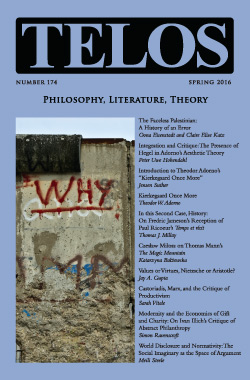This article presents the connections between the Polish poet Czesław Miłosz and Thomas Mann’s The Magic Mountain. Miłosz’s fascination with the German novel, which has its roots in the 1930s, changed profoundly over the decades. Not only did the poet ponder on the immense intellectual value of The Magic Mountain, but he also turned to it eagerly as a form of literary “substance” and inspiration for his own works (The Seizure of Power, A Magic Mountain). The novel left deep marks on the author of The Captive Mind, because throughout his whole life he sought references to his own life in the fictitious events and characters from Mann’s story. The chosen fragments of texts and conversations with the Polish poet enable us to investigate the history of the extraordinary connection between Miłosz and this twentieth-century epic masterpiece, indicating at the same time the key moments of this “literary relationship.”
|
Telos 174 (Spring 2016): Philosophy, Literature, Theory is now available for purchase in our store. |
||||
|
Telos Press Publishing · PO Box 811 · Candor, NY 13743 · Phone: 212-228-6479 Privacy Policy · Data Protection Copyright © 2024 Telos Press Publishing · All Rights Reserved |
||||








